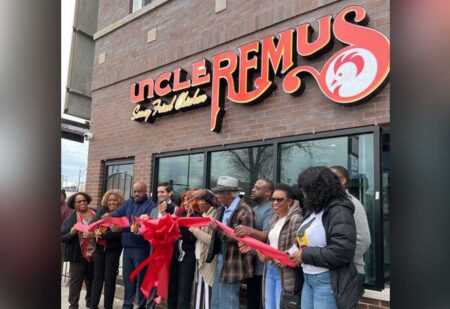When Veldarin Jackson received a call on Saturday that his 68-year-old mother had been found dead, he and his wife Adjoa rushed to her Rogers Park apartment. The pair entered the unit, and felt like they were walking into an oven.
“It was extremely hot in there,” Adjoa Jackson said. “You could hardly breathe.”
Advertisement
Janice Reed, who was found dead around 11:32 a.m. in that furnace-like apartment, was among three women who died on Saturday in a Rogers Park senior housing facility after residents had begged the property managers for days to turn off the heat and turn on the air conditioning amid record-breaking temperatures, according to the residents, family members and the Cook County medical examiner’s office.
Delores McNeely, 76, and Gwendolyn Osborne, 72, also died in their apartments. The medical examiner’s office has not yet ruled on a cause of death.
Advertisement
The deaths at the James Sneider apartments at 7450 N. Rogers Ave. resulted in condemnation and sorrow from residents who say they lost friends and neighbors and suffered inhumane conditions as temperatures climbed into the 90s. They demanded solutions that would require landlords to appropriately provide cool living spaces during heat waves, pointing to climate change and its disproportionate impact on already vulnerable communities, as well as unequal access to reliable air conditioning across the city.
Ald. Maria Hadden, 49th, introduced a resolution on Monday that called on the city council to hold a hearing to investigate the deaths and explore legislative fixes.
“This was totally preventable,” said Leslie Perkins, chief of staff for Hadden, who had responded to complaints from residents last week.
When Adjoa Jackson heard her mother-in-law had died, she was shocked. Janice Reed had no major health problems and had planned to have lunch with a friend that day. When she didn’t show for lunch, the friend asked for a well-being check.
“We wanted to know what had gone wrong,” Jackson said.
When she and her husband showed up in the unit after learning Reed had died, they had to crack the door for circulation due to the oppressive heat, she said. The couple spoke to Reed’s neighbors, who reported that they had complained to the building’s management for days because the heat remained on instead of the air conditioning. According to the National Weather Service, the city set a record on May 11 when it reached 90 degrees.
Later that afternoon, while Adjoa and Veldarin Jackson were at the apartment building, they learned two more bodies were found. Residents began going door to door to check on their neighbors.
“I was very very angry,” Adjoa Jackson said. “These are our elderly people. How can you treat them that way?”
Advertisement
She was close to her mother-in-law, who was more like a true mother to her, she said.
“It was mom and daughter, just like I was born from her,” Adjoa Jackson said.
Lorna Barnes, a 64-year-old resident of the building, said she first complained to management about the heat on May 10, four days before the three women died.
“I even said to them, ‘I don’t want to die in my apartment,’” Barnes said, growing tearful.
Building management offered her fans and erroneously cited a Chicago heat ordinance, claiming it required the building to keep heat on until June 1, Barnes said. Barnes said she called Hadden, as well as the city’s 311 line.
“I was scared to go to sleep,” Barnes said. “I don’t have anywhere else to go.”
Advertisement
Hadden, who represents the district the building is in, was first contacted by residents on Thursday and responded to the area, according to her staff members. She told the building managers that they needed to turn off the heat and turn on the air conditioning.
The managers responded in the same way they did to Barnes, incorrectly telling the alderman that the city’s heat ordinance requires the building to remain heated until June 1, Perkins said. The ordinance sets a daytime temperature requirement of at least 68 degrees from Sept. 15 to June 1, but has no requirement that the heat has to stay on if temperatures will naturally exceed that threshold.
The building eventually turned off the heat, but reported that it takes some time for its system to be able to switch over to air conditioning, Perkins said.
“Maybe we need to change some ordinances if common sense isn’t prevailing,” Hadden said in a video posted to her Facebook page.
In response to questions from the Tribune, the Hispanic Housing Development Corporation, which manages the Rogers Park building, said in a statement that it is working with the city and conducting its own investigation.
“We are deeply saddened by the deaths of three residents at 7450 N. Rogers,” the statement said. “The safety and security of our residents has always been our highest priority.”
Advertisement
The 10-story structure was permitted for construction in 2002 with 120 units, city records showed. The web site for the apartments advertises 24-hour on-call live-in maintenance, with heat and central air conditioning included in the rent.
The building passed an annual inspection in November of 2021, and passed a complaint inspection in 2021 and a ventilation complaint inspection in 2019, with no code violations reported, city records showed.
Code violations listed in online city records dated to 2014 and earlier, include failures to properly maintain elevators, install smoke detectors in some stairwells, and to provide for testing of the fire pump.
The Department of Buildings had no record of any open violation at the site, but was working on a report of its findings from inspecting the building this past weekend, a spokesperson said. The department also issued a statement that the women’s tragic deaths “were felt by all Chicagoans.”
It noted that in larger properties, the switch between heating to cooling systems may take hours or days. If any residents are experiencing uncomfortably warm temperatures in their buildings, officials said, they should call 311 and building management, and city officials will respond.
Barnes is now advocating for the city to pass a cooling ordinance and pursue other solutions that would protect people from increasingly extreme weather events.
Advertisement
“With climate change, we have more heat in the atmosphere and temperatures are going up,” said Daniel Horton, assistant professor in the department of earth and planetary sciences at Northwestern University. “That increases the likelihood of more frequent and more intense heat waves.”
Horton noted that heat waves during the spring and fall seasons, like the one experienced last week, can pose greater danger because people are less prepared than when they fall during the height of the summer.
Though the city has a heating ordinance that requires landlords maintain livable temperatures in the winter, there is no similar measure for the summer for most types of residences. The city requires air conditioning for nursing and assisted-living facilities, but there is no air conditioning requirement for typical residential buildings.
Among other possible preventative measures: The city could develop a “heat vulnerability index,” which would use information from the National Weather Service and other demographical figures to determine who is most at risk during weather events and plan to protect those communities accordingly, Horton said. He also said communities can try to establish “social infrastructures” that would build systems where community members check on each other during adverse weather events like extreme heat.
Hadden’s resolution, which will be introduced at the city council meeting next week, calls for a hearing that would involve testimony from residents as well as the Hispanic Housing Development Corporation. It also calls for the participation of the city’s law department, buildings department and other agencies in order to investigate possible city-based solutions.
“Until you try to sleep in an oven, you will never understand what residents went through last week,” Barnes said.
Advertisement
mabuckley@chicagotribune.com
rmccoppin@chicagotribune.com





